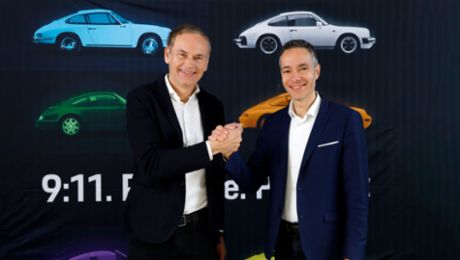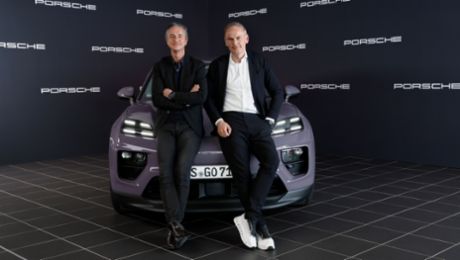When Ding Yi engraves woodcut elements for an image, that is a form of acceleration. The sharp blade of the knife boosts the tempo of the multilayered play of color, says the Chinese artist, who has spent more than three decades developing his “Appearance of Crosses” series. The recurring motif in the form of + and x symbols adorns large canvases on display in well-known museums. In 2022, the year he turned 60, Ding Yi formulated a dream: to apply his work to a Porsche Taycan. And that’s exactly what happened with one of the most complex paint jobs in company history.
Each color was added individually using special masking films and incorporating different consistencies to create varying surface materials on the outside and in the interior. The perfect reproduction of color wouldn’t have been possible without a sophisticated screen printing process. A multilayered clear coat protects the symbiosis of art and resistance to wind and weather, as even a one-of-a-kind custom car like this has to fulfill all of the Porsche standards for everyday use, including suitable repair processes should something ever go wrong on the streets of Shanghai. As one of the project managers, the artist played an active role in fulfilling his dream at Porsche Exclusive Manufaktur. For visionaries like Ding Yi, personal involvement and experience are part and parcel of the special request program.
Driven by Dreams
“Dreams can be powerful. They encourage us to never give up,” says Detlev von Platen, Member of the Executive Board responsible for Sales and Marketing, quoting Ferry Porsche, who decided to build the car of his dreams when it was nowhere to be found. “That’s where you’ll find our roots and the origin of our brand purpose, ‘Driven by Dreams’.Creativity, personal design freedom, and an exclusive experience—that’s what modern luxury means to us.” Making dreams a reality is the responsibility of the Production and Logistics department. “We make dreams come true. That’s what drives us,” explains Albrecht Reimold, who oversees the department. “We bring the best of two worlds together: industrial production excellence for extraordinary quality and manufacturing expertise in car customization.”
Realizing customers’ dreams enriches the company’s history with fascinating custom cars, some of which would qualify as eccentric or could be displayed at a museum. Customization is a growing market. These days, more than 90 percent of all 911 customers choose at least one option from the Porsche Exclusive Manufaktur portfolio. And limited-run, meticulously designed special editions often sell out shortly after their unveiling.
Individuality Based on Tradition
Even in the 1950s, Ferry Porsche viewed special requests as orders, whether race car modifications or an elegant car radio. When the 911 replaced the 356, customers began sharing more and more ideas. To maintain the quality of performance-enhancing measures, Porsche began officially selling spare parts for racing—along with fitting advice—in 1970.
In response to growing demand for support on the racetrack, the company soon established its own customer racing department, which was followed by the special request department for modifying series production cars in 1978. Alongside the tuning trend, the desire to upgrade the interior took off in the 1980s, with wood and leather, wild color patterns, and room-filling hi-fi systems.
Dreams can be powerful. They encourage us to never give up. Detlev von Platen, Member of the Executive Board responsible for Sales and Marketing
In response, Porsche was the world’s first car manufacturer to establish its own department for in-factory customization in 1986. Its range now encompasses more than 1,000 Porsche Exclusive Manufaktur options for elegant details and high-tech solutions. And the “Paint to Sample” and “Paint to Sample Plus” programs offer an almost endless configuration spectrum for exterior colors. The new “Personalize” product program enables personalization directly in the configurator. More involved customer requests, including custom cars, are the responsibility of the special request program.
Extraordinary Designs from the Past
Some customers have aesthetic or racing dreams they want to apply to Porsche. And then there are those who are looking for customized complete technology and design packages. But this is nothing new. For example, Herbert von Karajan ordered his very own lightweight version of the 911 Turbo 3.0 in 1974. He applied the same level of dedication to selecting the car’s performance equipment upgrades that he did to conducting the Berlin Philharmonic orchestra.
His car was the only 911 Turbo with the lightweight body of the Carrera RS—and ended up on the cover of the _Berühmte Ouvertüren_ album sporting the Martini Racing look. Or, for instance, take Mansour Ojjeh, the former owner of the Techniques d’Avant Garde (TAG) investment firm, who ordered the Formula 1 engine from Porsche and, in 1983, requested a street version of the successful 935 race car. The result was a one-of-a-kind 409 PS Turbo in Candy Apple based on the Porsche 930. Unlike the regular 911, this model featured a flat nose with pop-up headlights. Ojjeh requested a majestic rear spoiler along with the finest leather in light beige, wood paneling, and a Clarion hi-fi system in the interior. His flat-nosed 935 “Street” proved to be quite a hit, and Porsche saw the potential. By 1989, a total of 948 examples of the flatnose 911 Turbo had been ordered.
Special Editions Born from Dreams
“The ideas and requests submitted to Porsche Exclusive and Porsche Classic reveal the sheer diversity of exclusive customer dreams,” explains von Platen. “We also find inspiration in the globally active community—through social media and our Porsche Clubs.” Close to a quarter of a million enthusiasts are members of more than 700 Porsche Clubs in 86 countries. On the basis of intensive customer contact, Porsche develops wish lists for very highly positioned models in the GT range as well as for special limited editions. Take the 911 S/T, for instance, a gift to mark the series’ 60th anniversary.
The idea was to make the model as light, powerful, puristic, and seamless as possible. The story of its origin is quite interesting. Following the release of the first ultra-sporty Porsche 911 S in 1969 and the arrival of the first purist-focused 911 Carrera T a short time later, customers promptly called for a combination of the two. What was once managed primarily in house and occasionally also by Porsche Motorsport with the unofficial abbreviation ST is now integrated into the anniversary model. The 911 S/T combines elements of the 911 GT3 RS with the body of the 911 GT3 Touring and specially developed lightweight components. The naturally aspirated four-liter, six-cylinder boxer engine sourced from the GT3 RS (911 GT3 RS (WLTP)*: Fuel consumption combined: 13.2 l/100 km; CO₂ emissions combined: 299 g/km; CO₂ class: G) applies 386 kW (525 PS) to the road via a manual transmission and lightweight clutch. Inspired by the 60th anniversary, the dream car was limited to 1,963 examples, all of which sold out at the unveiling.
Porsche Production 4.0
“An edition as exclusive as this requires precise production planning and special tools developed by our employees themselves,” explains Reimold. “Our flexible production system, Porsche Production 4.0, is also designed for high levels of personalization—with the fundamental principles of smart, lean, and green. The variety of potential designs can transform just about any two-door sports car into a one of a kind. But a limited special edition like the 911 S/T also requires a great deal of highly qualified craftsmanship. That is why for special models we not only rely on Porsche Exclusive Manufaktur, but also integrate another section of production into our sports car assembly with CFK-Manufaktur. High-tech solutions and craftsmanship set Porsche production apart.”
Following final assembly, 60 employees working in three shifts add the finishing touches to an average of around 120 cars daily at Porsche Exclusive Manufaktur, which has its own trimshop.
High-tech solutions and craftsmanship set Porsche production apart. Albrecht Reimold, Member of the Executive Board responsible for Production and Logistics
The second craftsmanship department, CFK Manufaktur, is positioned upstream and is something akin to a temporary departure from the assembly line. Once the GT models leave the body shop and paint shop, three employees here see to the lightweight CFRP components, which are the doors, fenders, and front hoods.
Porsche has sophisticated logistics to integrate highly personalised customer cars and special series into regular sports car assembly at the Zuffenhausen factory. Parts are delivered with precision down to the minute, ensuring seamless assembly of the 911 S/T—for example, when installing the model-specific engine vent grille, magnesium wheels, or the racing clutch. Some of the Heritage Design package components for the 911 S/T, such as the full bucket seats in Black/Classic Cognac and the embossed leather cover of the central console are delivered directly to the assembly line. “Our fully connected smart factory allows us to produce a whole host of model variants with lots of customization options on a single assembly line, which is a key hallmark of the Zuffenhausen site,” says Reimold.
Following final assembly, the 911 S/T undergoes finishing with additional components of the Heritage Design package at Exclusive Manufaktur, where employees apply final details such as the motorsport graphic with Porsche lettering on the side. Individually selected equipment features in the interior such as air vents edged in leather are also installed here. “With iconic vehicles of superior quality such as the 911 S/T, we increase the appeal of our brand time and time again,” says von Platen. “We listen to our customers and make their dreams come true.” This promise has been a recipe for success—for 75 years.
The content of this website presents selected information from the annual and sustainability report 2023 of Porsche AG. All information therefore relates to the reporting date and has not been updated since its publication on March 12, 2024. The German PDF document of the annual and sustainability report is legally binding.





